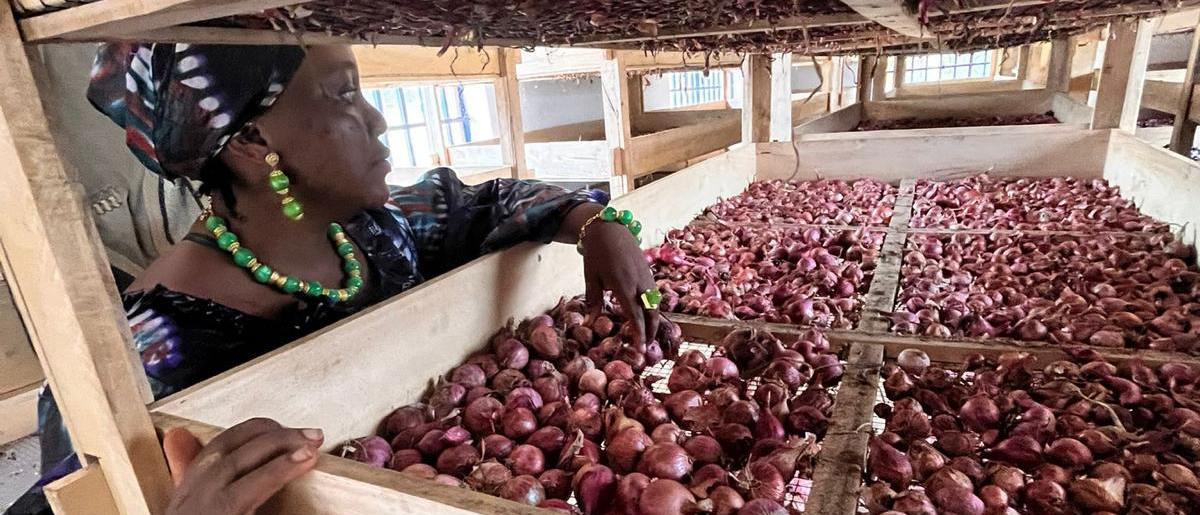Sierra Leone: from assessment to concrete action for sustainable food systems

A wind of change is blowing in Sierra Leone, one that will help ensure the people’s access to more locally produced, sustainable and nutritious food. With the ‘Feed Salone Strategy’, the Government intends to mobilize investments to boost agricultural productivity as part of its plan to enhance food security and inclusive economic growth. FAO Investment Centre, together with FAO/Sierra Leone, is contributing to its implementation.
From a situation report to tangible transformations
Building a clear roadmap was key to start the transformation into economically, environmentally and socially sustainable agrifood systems in Sierra Leone. Two key processes underpinned this: the Sierra Leone Food System Profile (2022), which identified opportunities and challenges to the country’s sustainable food systems, produced in partnership with the Government, the European Union, CIRAD and FAO as well as; the UN Food System Summit Roadmap (2021), that established national pathways to attain sustainable access to safe and nutritious foods.
These global initiatives contributed to a groundswell of interest in Sierra Leone to transform the agrifood system into a dynamic source of inclusive and sustainable growth in the country. Launched in October 2023, the Feed Salone Strategy is the Government’s flagship initiative built on 6 strategic pillars to develop the country’s vision for food systems transformation.
Dr Henry Musa Kpaka, Minister of Agriculture and Food Security said: “Our goal with the Feed Salone strategy is to reduce imports of key staples, boost export earnings from agriculture, create jobs and generate income, alleviate hunger and malnutrition, and improve climate resilience. Transforming agrifood systems with all stakeholders at national and local levels will boost the entire country’s resilience and position agriculture as the engine of economic growth in our country”.
Under the Sustainable Agrifood Systems Intelligence (SASI) initiative, the European Union is providing financial support to FAO and Agrinatura, to assist the Government of Sierra Leone in its investment efforts. “Building on what was done in the last years, the European Union is supporting the operationalization of the agrifood system transition in Sierra Leone. Agrifood systems can be seen as a multi-stakeholder and multi-sector platform that can have tremendous and sustainable impact on the country”, said Alexandre Serres, Policy Officer at the EU Delegation in Freetown.
Greater collaboration at country level
An FAO team from the Investment Centre and the country office is supporting the Ministry of Agriculture and Food Security to operationalize Feed Salone’s pillar on Aggregation, Processing and Market Linkages. The objective is to identify and prioritize investments that would help transform agrifood systems and improve the livelihoods of people in the immediate term.
“The Government has prioritized rice, poultry, and onion which are highly consumed and largely imported in Sierra Leone together with cassava which is the second staple food, as well as cashew and cocoa which, especially in organic form, bring foreign exchange earnings to the country and incomes to farmers”, explains Saeed Abubakar Bancie, FAO Representative in the country. The Centre is also assisting the National Monitoring and Evaluation Agency to develop the Results Monitoring framework for Feed Salone, to measure accurately the impacts of the Strategy and developments within the agrifood system.
“We are also supporting the Government to understand and attract climate finance, which could have significant results on environmental sustainability”, says James Tefft, from FAO Investment Centre. “Various stakeholders in the agrifood system say that there are capacity and knowledge gaps around climate finance, particularly on international sources of climate finance and carbon markets, which are an important potential source of finance for the country”. Training will shortly take place to guide public stakeholders and national financial institutions on how to access international climate financing opportunities.
The FAO Investment Centre is providing technical assistance to several development partners in the country for the implementation of Feed Salone, including the prioritization of interventions under the EU portfolio; an IFAD-financed Government intervention in the livestock sector, and to the World Bank’s Smallholder Commercialization and Agribusiness Development Project.
Alessandro Marini, FAO Investment Centre Service Chief for West and Central Africa, concludes: “Sierra Leone exemplifies how the Investment Centre, through its work with different financing partners, helps governments identify synergies to maximize impact at the country level. Concrete investments will have long-term sustainable impacts on food security for the people of Sierra Leone.”
